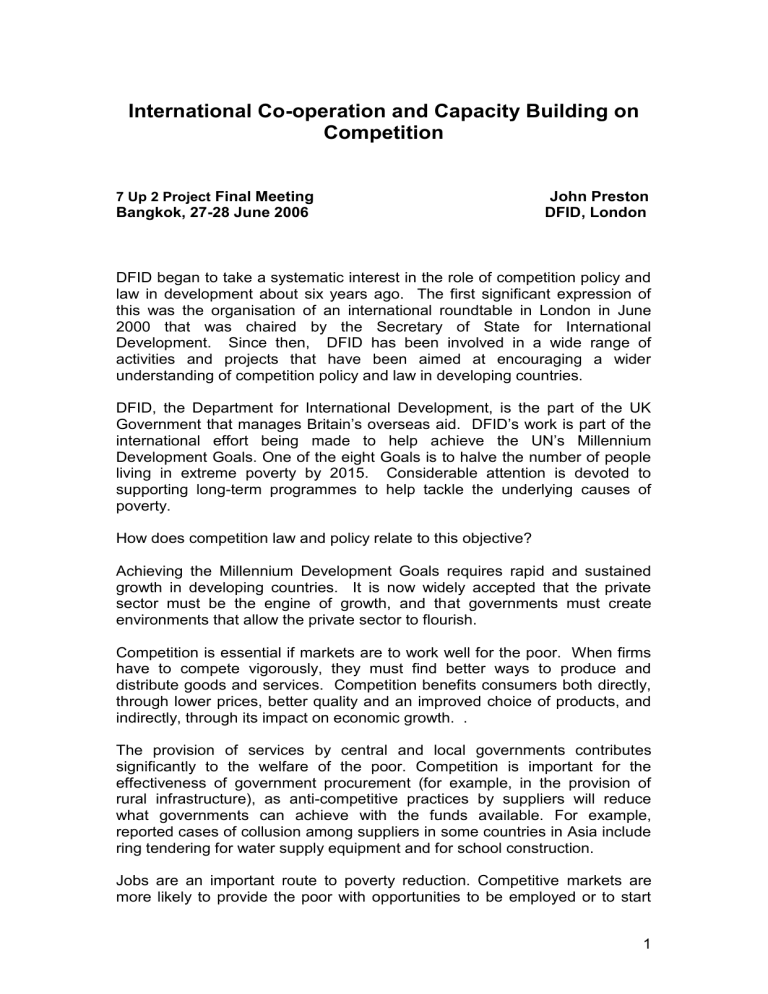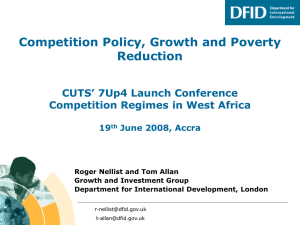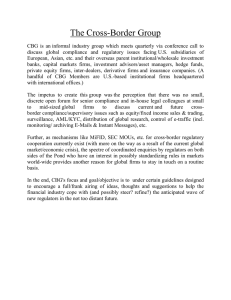International Co-operation and Capacity Building on Competition

International Co-operation and Capacity Building on
Competition
7 Up 2 Project Final Meeting John Preston
Bangkok, 27-28 June 2006 DFID, London
DFID began to take a systematic interest in the role of competition policy and law in development about six years ago. The first significant expression of this was the organisation of an international roundtable in London in June
2000 that was chaired by the Secretary of State for International
Development. Since then, DFID has been involved in a wide range of activities and projects that have been aimed at encouraging a wider understanding of competition policy and law in developing countries.
DFID, the Department for International Development, is the part of the UK
Government that manages Britain’s overseas aid. DFID’s work is part of the international effort being made to help a chieve the UN’s Millennium
Development Goals. One of the eight Goals is to halve the number of people living in extreme poverty by 2015. Considerable attention is devoted to supporting long-term programmes to help tackle the underlying causes of poverty.
How does competition law and policy relate to this objective?
Achieving the Millennium Development Goals requires rapid and sustained growth in developing countries. It is now widely accepted that the private sector must be the engine of growth, and that governments must create environments that allow the private sector to flourish.
Competition is essential if markets are to work well for the poor. When firms have to compete vigorously, they must find better ways to produce and distribute goods and services. Competition benefits consumers both directly, through lower prices, better quality and an improved choice of products, and indirectly, through its impact on economic growth. .
The provision of services by central and local governments contributes significantly to the welfare of the poor. Competition is important for the effectiveness of government procurement (for example, in the provision of rural infrastructure), as anti-competitive practices by suppliers will reduce what governments can achieve with the funds available. For example, reported cases of collusion among suppliers in some countries in Asia include ring tendering for water supply equipment and for school construction.
Jobs are an important route to poverty reduction. Competitive markets are more likely to provide the poor with opportunities to be employed or to start
1
their own small business. These opportunities include export-oriented industries. ‘Competitiveness’ is not synonymous with ‘competition’, but firms and sectors are far more likely to be competitive internationally if they operate within competitive domestic markets.
Competitive domestic markets benefit farmers. They will be in a more favourable position if the markets in which they buy their inputs, arrange transport of their crops to market and sell their outputs are competitive.
Such views are complemented by a growing body of evidence on the link between growth and poverty reduction. The World Bank’s World
Development Report 2005 emphasised the importance of competition for investment, and noted how competitive pressure leads to innovation, new products and new technology. When it released Asian Development Outlook
2005 in April 2005, the Asian Development Bank headlined its view that
“effective competition policies are needed “if Asian countries are to maintain their high rates of growth and employment”.
The existence of competition policy reduces uncertainty for business, and is an important element of a good regulatory package for private sector development. There are also indications that, by reducing the scope for arbitrary decisions by officials, competition law reduces the scope for corruption. Corruption hurts the poor.
Competition policy, including competition law, is needed because markets do not always work well. Anticompetitive actions by firms are one cause, but inappropriate regulations by national, state and local governments also are frequent causes of market failure.
A favourable view of competition policy’s contribution to economic growth is widely held. An OECD paper based on a survey of members and invited nonmembers who participated in the 2002 Global Forum on Competition concluded that:
”There are strong links between competition policy and numerous basic pillars of economic develo pment…There is persuasive evidence from all over the world confirming that rising levels of competition have been unambiguously associated with increased economic growth, productivity, investment and increased average living standards”.
Competitive markets allow new firms to enter, efficient firms to thrive, and sub-standard firms to fail and exit. A study of 53 countries by two World Bank economists, Dutz and Hayri, found a strong correlation between the effectiveness of competition policy and law and growth. The Australian
Productivity Commission found its National Competition Policy reforms mean national output would be 2.5% higher than otherwise – an amount equivalent to almost one year of economic growth”. This estimate did not include the dynamic efficiency gains also expected to flow from the competition reforms.
2
There is increasing information on the harm anti-competitive practices in both national and international markets can do to developing countries.
Studies of international cartels investigated by E.C. and USA competition authorities illustrate their large impact on poor countries. The World Bank’s
Global Economic Prospects 2003 noted six international cartels overcharged developing countries $3 to $7 billion in the 1990s. A study of one major cartel
(vitamins) found that suppliers had overcharged developing countries that lacked a competition law more than countries that had such a law.
Much has been written by economists on the harmful effects of monopoly on prices, output and consumer welfare. However, there is a need for much more empirical research on the impact of competition policy on national economies, and particularly on the impacts on developing countries. There are several possible reasons for the limited scale of empirical research, including limits on the availability of data. Most developing countries with a competition law have adopted it relatively recently, and the law’s introductions often accompanied other significant policy changes, including privatisation, deregulation and trade liberalisation. Separating the effects of these policies presents a challenge.
The research that has been undertaken for the 7Up 2 project will help to fill part of this gap, but it is important that research continues.
Developing countries must choose carefully how to use them financial and human resources to best advantage. Cooperation arrangements between competition authorities, including those involving other members of regional groups, can be useful.
Competition policy and law is still new in much of the world and there are a few areas of controversy. One of these is whether every country needs a competition law. Some people argue that if a country is open to trade and investment, it does not need a competition law. Openness to trade and investment can have large and beneficial impacts on competition. However, foreign investment can bring heightened concern in developing countries about competition, and, in any case, some goods and services cannot be traded internationally. Competition policy and law can benefit all countries, whatever their size and level of development, but the law must be appropriate to their needs. As the 2001 Nobel Prize winner Joseph Stiglitz said: “Strong competition policy is not just a luxury to be enjoyed by rich countries, but a real necessity for those striving to create democratic market economies”.
Sector regulators are required where competition cannot work effectively, such as with natural monopolies. Regulated sectors generally include major public utilities that are important for consumer welfare. Decisions made by sector regulators include technical issues, and pricing or profit ceilings.
However, some decisions by regulators are on matters that affect competition.
In these cases their decisions should reflect competition principles. If not, there can be distortions in the use of national resources that can harm consumers, including the poor.
3
Having a competition law does not mean that a country cannot have an industrial policy. Every national competition law includes some allowances for national priorities, and there is no necessary conflict between competition and industrial policy. Well-designed policies can be complementary for industry, services and agriculture.
The introduction of a competition law should be accompanied by efforts to help develop a ‘culture of competition’. A ‘culture of competition’, is where the rules and benefits of competition are widely known, and form a natural part of the background for decisions by firms and governments. Building a culture of competition and an effective competition regime is a long-term endeavour, and not just a matter for oneoff events. Competition must be ‘mainstreamed’ in all sectors.
Advocacy is needed for a new competition regime to succeed. Politicians and officials need to understand why competition is good for the economy, and how to apply its principles to government decisions. There is a need to overcome opposition from the business sector, by emphasising the benefits competition law can provide, such as cheaper inputs, and the contribution competition law and policy can make to creating a good pro-investment climate.
In our view, modern regulatory regimes for private sector development should include competition policy regimes. There are several desirable features for competition policy and law.
1. The design of the law should reflect the level of economic development of the country concerned, the structure of its economy and its constitution and culture. A competition law should not simply be transplanted from a developed country, or even from another developing country. A competition law should not stand alone, but should be part of a well-designed package of measures to create the right environment to allow competitive markets to benefit the poor.
2. The introduction of competition policy and law should be reflected in the annual and medium-term plans and budgets of governments. Activities supported by donors should be adequately planned, and appropriately monitored.
3. The focus of a competition law should stay as close as possible to the objective of fostering competition in markets. Other social and political objectives should, ideally, be targeted through more specific measures in other legislation. Exceptions and exemptions should be minimised, as competition law is most effective when applied broadly to the economy, including to state-owned enterprises.
4. Whatever division of responsibility between sector regulators and the competition authority is chosen for decisions on competition issues, there should be an effective working relationship between the regulators and the
4
authority to assist regulators to apply sound competition principles to their sectors.
5. A competition authority should be independent of government in its dayto-day decisions. This has implications for the selection of people to be appointed to the authority. The authority should have an adequate budget, and should be staffed by competent officials.
6. A new competition authority needs to prioritise its work carefully. A good rule of thumb, at least initially, is to concentrate on cases where entry barriers seem high, where prices seem high, and where consumers will benefit most.
These initial targets should include those with the least substantial vested interests that would oppose change. That is, to improve support from consumers and politicians for the new competition law, the competition authority should choose an early “winner”.
DFID continues to seek ways to foster a wider appreciation of the significant contribution that competitive markets can make to economic growth and poverty reduction, and to encourage the wider adoption of well-formulated competition policy and law. We very much look forward to hearing of future developments in the competition policy of the countries that have taken part 7
Up 2, a project that we are pleased we have been able to assist with.
Thank you.
5





